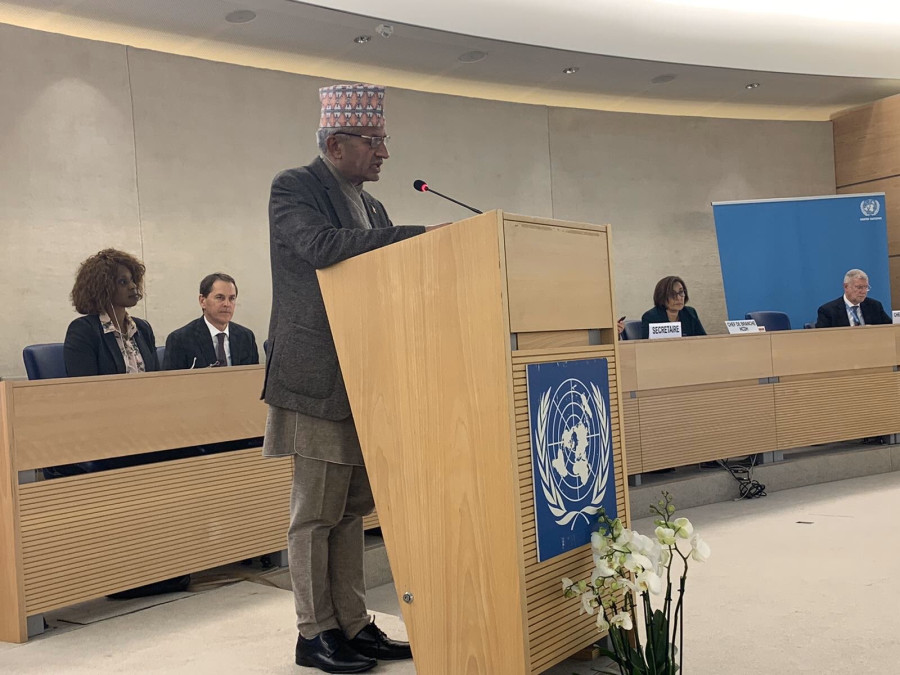National
Gyawali claims progress on transitional justice in Geneva but back home, victims are boycotting the process
Rights activists and victims call Foreign Minister Pradeep Gyawali’s claim that the transitional justice commissions are working independently a ‘blatant lie’.
Binod Ghimire
While victims of the decade-long Maoist insurgency are refusing to cooperate with the transitional justice process back home, Minister for Foreign Affairs Pradeep Gyawali has claimed in Geneva that Nepal presents “a uniquely successful nationally led and owned conflict transformation and peace process”.
Addressing the 43rd session of the Human Rights Council in Geneva on Tuesday, Gyawali said that the two transitional justice bodies—the Truth and Reconciliation Commission and the Commission of Investigation on Enforced Disappeared Persons—are working independently to deal with conflict-era cases of human rights violations.
“We stand firmly [sic] to our commitment to addressing remaining issues of transitional justice in accordance with the Comprehensive Peace Accord, directive of the Supreme Court, relevant international commitments, concerns of the victims, and the ground realities,” he said.
Gyawali had made similar commitments at the Council’s meeting on March 1 last year, where he claimed that the Nepal government was preparing to amend the transitional justice law in consultation with, and participation of, the victims. However, a year on, the 2014 Enforced Disappeared Enquiry, Truth and Reconciliation Commission Act, remains unamended, and conflict victims have roundly criticised the ongoing transitional justice process on the grounds that it is politically motivated.
“Gyawali’s claim that the transitional justice bodies are working independently is a blatant lie,” said Janak Raut, general secretary of the Conflict Victims’ Common Platform. “How can the people appointed on political quotas perform independently?”
Raut was referring to the reconstitution of the two transitional justice commissions after commission members were relieved of their duties in April last year for failing to make any substantial progress. The chiefs and members of the commissions were then hand-picked by the political parties in January, much to the dismay of conflict victims.
“We are not going to accept this leadership,” Bhagiram Chaudhari, chair of the Conflict Victims’ Common Platform, had told the Post then.
Despite widespread condemnation of the parties’ decision by victims and local and international rights groups, the government had pushed through with the transitional justice process, promising that it would hold proper consultations with victims.
“The newly appointed commissioners have started functioning in full swing,” Gyawali said in Geneva.
The commissions have started working, but they have not taken the primary constituency of the transitional justice process on board, which has been par the course for Nepal’s transitional justice process. Victims have been consistently sidelined, they say.
The government on January 13 held ‘consultations’ at the seven provincial headquarters but victims called the process a “sham” as the three hours provided was not nearly enough for all victims to present their cases. They also said that all victims, whether of torture, rape, and murder, were put into the same basket when their needs and demands are markedly different.
Despite Gyawali’s assurances before the Human Rights Council, victims have said that they will not cooperate with the newly appointed teams in the two commissions until the transitional justice Act is amended as per the Supreme Court’s 2015 ruling.
In 2015, the apex court struck down around a dozen provisions in the Act that allowed amnesty even in cases of severe human rights violations, and directed the government to revise the law in line with international norms.
The government is working on the amendment bill but once again, victims say that they have not been consulted.
Human rights activists say that Gyawali has attempted to disillusion the international community that Nepal is committed to ensuring justice for victims by claiming that the two commissions are working independently.
“It is clear that the new teams were appointed to the two commissions despite reservations because Gyawali needed something to present before the council’s meeting,” Charan Prasai, a human rights activist, told the Post. “The government is not serious about providing justice to victims.”
While Gyawali did not face much scrutiny this time around in Geneva, he is certain to face a much tougher line of questioning in November, when Nepal appears before the Human Rights Council’s Universal Periodic Review. According to rights activists, nearly 200 human rights organisations are working jointly on a report on transitional justice and the country’s overall human rights situation.




 18.12°C Kathmandu
18.12°C Kathmandu














